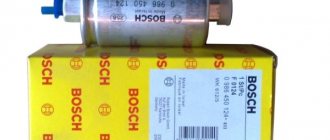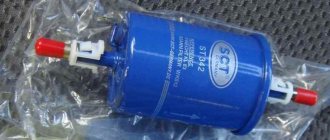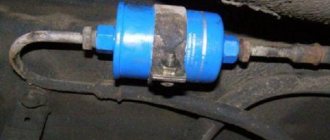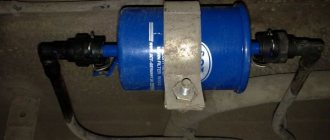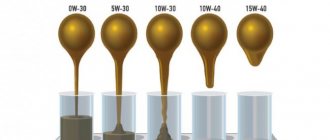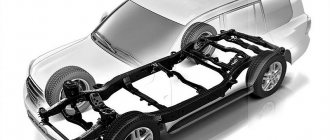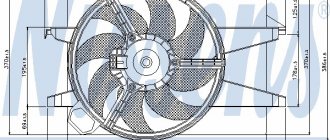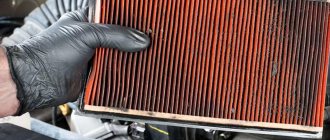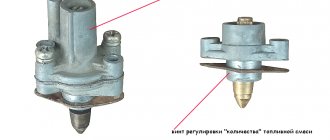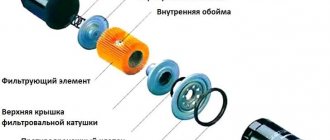Fuel filters are designed to clean fuel from foreign impurities. Any fuel contains some amount of dust, water and other impurities. Moreover, our fuel, especially in comparison with the same European analogues, is quite dirty. Therefore, having a good fuel filter is very important for long-term engine operation.
Below we will talk about the main types of fuel filters, their design, quality criteria, the features of fuel filters for diesel and gasoline engines, and also why it is important to change them on time. At the end of the article , watch a video on how to choose the right fuel filter for your car.
How does a fuel filter work?
Fuel filtration on modern cars is two-stage. In front of the fuel pump, a fine nylon receiving mesh screens out contaminant particles. And then the final screening of particles larger than 10 microns (for gasoline) is carried out by a fine filter.
The fuel module of the Lada 4x4 consists of a mesh fuel receiver and a fuel pump.
The fuel module of the Lada 4x4 consists of a mesh fuel receiver and a fuel pump.
Why is it so important to keep your fuel clean?
Gasoline and diesel fuel are the main sources of energy for industrial equipment. These machines are widely used for:
• construction; • logistics of goods and passengers; • mining and other activities.
Almost every piece of special equipment or transport operates on a strict schedule. Its downtime during repairs brings losses to the owner or customer . According to statistics, approximately 30% of repair work involves restoring fuel supply. The main causes of malfunctions: dirt, water, paraffin and other emulsions formed in gasoline or diesel fuel.
The sensitive injection equipment is the first to suffer. And at the same time, damage is caused to the piston group and the exhaust system (on cars with a catalytic converter). The cost of repairs amounts to tens of thousands of rubles. For example, restoring a Caterpillar fuel injection pump for C7 and C9 engines will cost about 80 thousand rubles, and a fuel injection pump from KamaZ 5360 will cost about 40 thousand rubles.
Figure 4 Injection pump repair
Of course, water and dirt are not the only enemies of fuel equipment. It may also suffer from factors such as:
• Viscosity . Too liquid D/T has poor lubricating properties, which leads to accelerated wear of the pump and injectors. And the dense structure of diesel fuel causes uneven combustion, which ensures the formation of carbon deposits and damage to the CPG. • Sulfur indicator . Russian diesel fuel is considered sulfurous. Approximately 80% of domestic manufacturers produce D/T with a sulfur content of at least 0.2%. The element enters into an oxidation reaction with the metal parts of the fuel injection pump, which quickly reduces their service life.
Therefore, many owners use lubricating additives for high-pressure fuel pumps.
However, low-quality products in additives do not dissolve well in D/T and clog the fine fuel filter. As a result, the formation of a lack of lubrication of the plungers with diesel fuel becomes detrimental to the injection pump. Metal shavings appear, gradually clogging the entire system. Cleaning it takes 2-3 days, and the cost of the service significantly hits the owner’s pocket.
The most popular brands of fuel filters for special equipment
More than 15 years of experience of our company in the market of spare parts and consumables for special equipment has allowed us to compile a rating of fine fuel filters according to popularity among customers. We invite you to familiarize yourself with the 10 procurement favorites: 1. YaMZ (RF). 2. DZAF (RF). 3. UFI (Italy). 4. Donaldson (USA). 5. FLEETGUARD (US/EU). 6. Luber-Finer (USA). 7. Shaanxi (PRC). 8. Weichai Power (PRC). 9. PILENGA (Italy). 10. Jcb Landpower (Britain).
Until 2014-2016, M..-F... was confidently included in the top list, but now owners of special equipment have many complaints about the German brand. Most likely this is due to the large-scale production of counterfeit parts under a well-known brand.
I would also like to say about Sakura , which are often found in the original equipment of Japanese tractors: Iseki, Mitsubishi, Kubota, Hinomoto, Yanmar, and which are difficult to find on the open market. When ordered, they cost 4-5 times more than their analogues, judging by the reviews of farmers. Therefore, many people replace Sakura with analogues: partly out of necessity, partly for the sake of economy.
Where is the fuel filter installed?
As for the location of the fine filter, automakers' opinions have changed over time. In the beginning, all filters were installed under the car's underbody or in the engine compartment and were easily accessible for replacement.
Fuel filter under the bottom of the car with threaded ends. |
The plastic fuel filter is connected to the power system with quick-release tips. |
Then (increasingly) the filter began to be installed in the fuel module. This solution is, of course, more compact and convenient for cars. But replacing the filter is either not provided at all, but only as part of the module, or it involves a large amount of work to dismantle and completely disassemble the module. Moreover, the fuel module of some cars cannot be removed without dismantling the tank, and this is an even more ambitious task.
Fuel module with built-in filter. |
After completely disassembling the module, it is possible to remove and replace the fuel filter. |
What will happen when driving with an old filter?
If clogged, the filter will lose its ability to perform its main function - to clean the fuel, so the fuel mixture injection nozzles and the entire power system will become clogged, and the required amount of normal fuel will not flow into the engine itself.
Fuel that has not undergone proper cleaning will burn out not evenly, but in fragments, and will begin to settle on the pistons, cylindrical partitions, and spark plugs. A fuel mixture containing heavy metals and other particles, as a result of combustion products entering the exhaust system through accelerators and a lambda probe, will begin to gradually reduce the service life of all these elements.
It cannot be said that a clogged filter directly affects fuel consumption. However, the increase in fuel consumption, which is observed in this case, will lead to a decrease in power. As a result, for normal use of the vehicle you will have to press the gas harder, which, in fact, requires more gasoline or diesel. Therefore, a clogged filter for the fuel mixture, without directly affecting gasoline consumption, leads to an increase in this parameter.
Thus, it is necessary to constantly monitor the condition of the fuel filter and, if signs of clogging appear, immediately replace the spare part, since its further use is guaranteed to lead to serious problems with engine operation, the solution of which requires significant material costs.
It should also be noted that the process of replacing the cleaning element itself is not at all difficult; if you have the appropriate skills, you can do everything yourself. You can also always seek help from professionals who will do everything quickly and efficiently.
Diesel fuel filter
So far we have been talking about gasoline filters. Diesel fuel filters are always installed separately from the fuel tank, because, in addition to more frequent replacement, they also need water sensors, a water drain plug and, often, a heating system.
Fuel filters for diesel engines.
Fuel filters for diesel engines.
Why do we filter?
Unfortunately, gasoline begins to become contaminated from the moment it is “born” at the refinery. Transportation of fuel in tanks also makes a contribution - they “breathe”, which means they allow dust to pass through.
Gasoline also becomes contaminated at gas stations, where dust enters the tank along with the fuel stream. And if the tank is not sealed, dust will be sucked into it continuously. And the tank itself may have scale and pockets of corrosion inside. And although iron oxides are significantly softer than, for example, quartz dust, they cannot be discounted.
The nature of pollution also depends on the region. Quartz dust is a problem in central Russia. In the southern regions of the country and in Western Siberia, another dust predominates - loess. This is a product of grinding loose rocks, containing, in addition to quartz, feldspar and clay minerals. Loess dust is softer than quartz, but this advantage is compensated by its large amount, which also leads to rapid contamination of the fuel.
The same is true for diesel fuel. Organic and mechanical impurities, as well as water, appear in it. Running a diesel engine on such fuel leads to corrosion of fuel equipment, accelerated wear of the cylinder-piston group, loss of power and other unpleasant consequences.
In cold weather, operators face additional troubles - paraffins precipitate in diesel fuel, clogging filters. To combat this phenomenon, heated filter elements are produced, in particular with a curtain made of conductive paper. Now let's move on to filtering.
What happens if the fuel filter is clogged?
The filters are, of course, damaged by the dirt that gets into the tanks of our cars along with the fuel. And it’s not the oil refineries that are to blame. Fuel can become contaminated during storage and transfer. And the driver will feel the clogging of the fuel filter by the behavior of the car, and first in those modes where the instantaneous fuel consumption of the engine is maximum. These are driving modes at high speeds and intense acceleration. In this case, the engine will lose traction and operate intermittently, although at idle and in “quiet” modes everything will look decent.
Diesel engine oil filter
Designed to separate contaminants contained in oil, such as dust, metal shavings, and coking products. Oil filters vary in design and volume of oil passing through.
Structurally, a diesel oil filter can be dismountable or non-removable. The main difference between the former is the possibility of servicing when clogged. The latter have to be changed, even if the resource has not yet been exhausted. There are also modular purifiers that can be partially disassembled, but they are expensive.
Based on the volume of lubricant passing through, oil filters are either full-flow or partial-flow. The full-flow one is connected sequentially to the line and passes the entire volume of circulating lubricant through itself, quickly cleaning it. The disadvantage of such parts is that they become clogged faster than partial flow ones. The latter are connected in parallel and clear only part of the stream at a time. The main advantage of partial flow parts is high cleaning quality and long service life. Their disadvantage is the rather low filtration rate.
The oil filter is changed at the same time as the engine lubricant; the replacement periods are indicated in the vehicle's operating manual.
How often should the fuel filter be changed?
The frequency of routine filter replacement is primarily determined by the vehicle manufacturer. For some manufacturers this is 30,000 km, for others - 120,000 km. Moreover, frequent replacements are usually recommended by manufacturers who place the filter outside the fuel tank. You should only change the fuel filter ahead of schedule if you are sure that foreign mechanical particles or a large amount of water have entered the tank. In this case, you should also rinse the tank and possibly replace the fuel pump.
Diesel engine fuel filters have the most difficult time in winter: after all, thickened fuel must pass through the filter material. That is why it is better to carry out preventive filter replacement on a diesel car in the fall. This is due to the fact that the filter capacity, already reduced by clogging with solid particles, will be insufficient to pass the cold, thickened fuel.
Frequency of replacement of gasoline filters of some manufacturers, thousand km:
- Volkswagen 30 (remote filters)
- Renault 120
- Kia 60
- Hyundai 60
- Lada 30 (remote filters), 120 (built-in filters)
Some tips for replacing the fuel filter:
- Refuel at proven, or even better, branded gas stations.
- Try not to pour fuel into the tank immediately after the fuel has been drained from the tanker at a gas station, because the fuel in the tank is agitated and dirt is more likely to get in.
- Do not pour fuel into old, rusty cans.
- Change fuel filters on time - then a malfunction will not catch you on a long journey.
- Wash the fuel intake strainer at the pump inlet: this will extend its service life.
Tell us in the comments if you have encountered problems related to fuel filters? Good luck on the roads everyone!
Fuel filter: should I change it or will it do the same?
Diesel engine air filter
It consists of a housing with a filter element inside. The purifier may have a ring or cylindrical shape. In the first case, the housing cover is screwed on top with screws, in the second case, rubber seals in the form of rings are installed on both sides.
During operation of the power unit, air enters through the intake pipe into the housing. As the flow passes through the filter element, foreign impurities are separated, after which the purified air is sent to the engine intake manifold.
If the diesel air filter is heavily clogged, it ceases to cope with its function and the engine becomes clogged, which over time leads to serious malfunctions. Therefore, the filter element must be periodically removed from the housing and its surface inspected.
Serviceability depends on model. If the filter element can be cleaned, but its service life has not yet been exhausted, the spare part is removed from the housing and blown with compressed air. The body part is washed with hot water or diesel fuel and dried thoroughly. After this, the element is put back and the part is closed with a lid.
If maintenance is not provided, the dirty filter must be replaced. Replacement periods are indicated in the technical documentation of the vehicle. When working in very dusty conditions, they should be reduced by 1.5–2 times.
